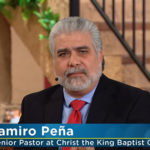BROWNWOOD—Preaching on ethics in the local church should focus on the gospel first and foremost, George Mason, pastor of Wilshire Baptist Church in Dallas, told an ethics conference at Howard Payne University.
“I suppose the first thing I ought to say to you is that I don’t believe you ought to preach on ethics in the local church,” Mason said, whose assigned topic was “Preaching on Ethics in the Local Church.”

George Mason
|
“I don’t mean you ought not to preach on anything that has ethical content, because then you wouldn’t be able to preach on anything at all, since everything has ethical content. I don’t mean, of course, that you ought to preach unethically, although I do believe that there’s some of that going on these days. I mean that the subject of preaching in not ethics per se. It’s the gospel.”
When ministers preach the good news of Jesus Christ, it inevitably will “touch on so many sore spots and funny bones in personal, social, political, economic, environmental, aesthetic and even athletic life that just preaching the gospel itself will be an ethical act,” he insisted.
The gospel must remain primary, Mason emphasized.
“The problem you see in deciding to preach now and again on ethics is that it tends to turn preaching into moralizing which gets the cart of doing good in front of the horse of grace that draws that cart along. Or two, that in the name of having a prophetic ministry, you fail to have a priestly one. That is, you get all up in arms, say, about nuclear arms and you end up having no arms left to comfort those who already feel bombarded by life,” he cautioned.
“Or three, you end up trivializing the Christian faith by making it seem that it fits somewhere on the op-ed pages or somewhere on cable TV between Glenn Beck and Keith Olbermann.”
Mason encouraged ministers to “strive more to be a faithful pastor than a lone prophet.” Most biblical prophets were not looking for the role, he noted.
Sign up for our weekly edition and get all our headlines in your inbox on Thursdays
“The true prophets seem to have the burden of truth in their bellies, and they couldn’t hold it in. They were most of them reluctant to take on the role, and most of them were proven to be real prophets only after they died,” Mason pointed out.
“Our job in preaching is to proclaim the gospel as best we can, not to build our own resume as a prophet of our time. If what we say proves prophetic, fine and good. Our duty as preachers is to speak what we feel in our bones is true and do it with a view toward building up the body of Christ, which is the church.”
As far as the church’s ability to speak to the secular world, it must get its own house in order first, he maintained.
“We have only the moral authority to speak to others in the measure that we are holding ourselves accountable,” Mason insisted.
“If we say we favor adoption over abortion, but then we create such a climate in our congregations that a young woman who gets pregnant feels she has to hide her pregnancy lest she be shamed or ostracized by the community, how is that consistent with the gospel? How is that ethical?”
Mason rejected the distinction between a personal gospel a social gospel, saying: “The gospel of our Lord Jesus Christ is concerned with the whole person. When people were hungry, Jesus didn’t say, ‘Is that political or social?’ He said, ‘I feed you,’ because the good news to a hungry person is bread.”
Christians should neglect sharing either bread for living or the Bread of Life, he stressed.
“Both are important, and that means we can never choose one over the other and get the full sense of (Christ’s) meaning,” Mason said.
Christians also must guard against going to extremes and making ministry merely a humanitarian project.
“It is not enough to get everyone a place at the table who feels equally honored to be there. It also is necessary for them to understand that it is the Lord’s table. That is to say, it is not merely bread and wine that we are sharing together, but it is the body and blood of Christ. Personal as well as social,” he said.
Mason urged ministers to be careful about preaching messages on ethical issues.
“Sermons are not white papers on abortion or homosexuality or health care or the wars in Iraq and Afghanistan or prayer in public schools. When people come to church, they are entitled to hear the good news of Jesus Christ from someone deeply acquainted with that subject. Along the way, in expounding on the gospel, there will be many opportunities to speak on ethical issues that the gospel touches on, but the gospel ought to come front and center, not something tacked on at invitation time after opining so brilliantly on an ethical subject,” he emphasized.













We seek to connect God’s story and God’s people around the world. To learn more about God’s story, click here.
Send comments and feedback to Eric Black, our editor. For comments to be published, please specify “letter to the editor.” Maximum length for publication is 300 words.